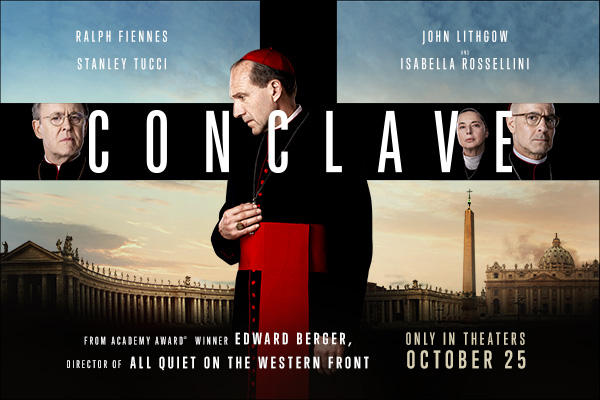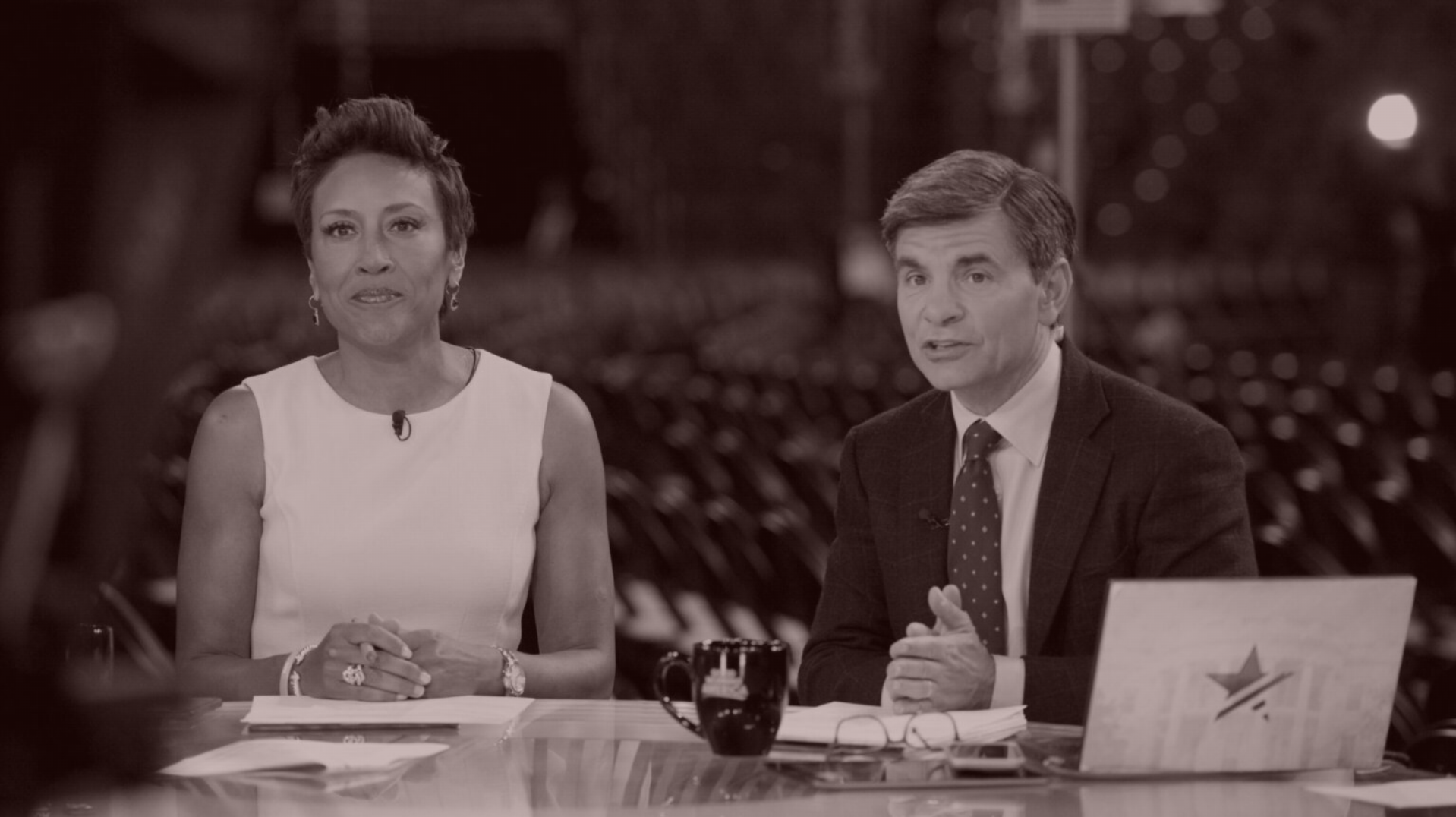 |
 |
|
Greetings from Los Angeles, happy Friday, and safe travels to those of you headed to Montecito for Google Zeitgeist. In tonight’s edition of In the Room, we return to the great leitmotif of this media moment: the economic realignment of TV news and the inevitable salary cuts coming for all but a few of the most notable talents. Perhaps that helps explain why so many green room denizens are flooding my inbox with questions about Amazon’s new Election Night penny ante.
Speaking of talent salaries, I joined my colleague Matt Belloni this week on The Town—his peerless Hollywood podcast—to talk about the end of the TV news star system and Hoda Kotb’s exit from Today, which of course was only partly about her desire to write a new chapter. Listen here.
|
|
A MESSAGE FROM OUR SPONSOR
|
 |
| Ralph Fiennes, Stanley Tucci, John Lithgow and Isabella Rossellini star in this gripping thriller that follows one of the world’s most secretive and ancient events – selecting the new Pope. What happens behind these walls will change everything.
From Academy Award-winning director Edward Berger
CONCLAVE
Only in theaters October 25
WATCH THE TRAILER
|
|
|
|
But first, a couple updates from my partner John Ourand…
- Why I left The Athletic: The Athletic’s chief content officer, Paul Fichtenbaum, the former editor-in-chief of Sports Illustrated, is leaving the New York Times Company-owned publication. His last day is tomorrow, and he plans to do some consulting and advisory work before searching for a new job. Fichtenbaum’s arrival at The Athletic gave an instant dose of credibility to the startup. But The Athletic found it hard to maintain its startup mentality after the Times Co. acquired the business for a staggering $550 million, far more than other bidders were willing to stomach. And while the newspaper killed off its own sports section to make room for the disruptor, The Athletic inevitably became a more establishment—Timesian, if you will—kinda joint.
On September 9, just after Fichtenbaum finished a standards presentation to The Athletic’s hockey journalists in New York, he told his bosses that he wanted to take a break. In a note to The Athletic’s staff this week, Fichtenbaum reflected on the vision of co-founders Alex Mather and Adam Hansmann, who had met while working on the startup Strava, and went on to enjoy the greatest sports media exit of their generation. “Although they didn’t have formal journalism experience, Alex and Adam had the smarts, moxie and compassion to start and run a business that filled a gaping hole in the sports media landscape for differentiated, quality work,” Fichtenbaum wrote. “Quickly, The Athletic became an influential voice and a central part of the local and national fan experience.”
- YouTube’s big hire: Jen Chun, the NBA executive most responsible for negotiating the league’s local rights deal with Diamond Sports, has left to join YouTube as managing director and head of sports and studio partnerships. At the NBA, Chun was an E.V.P. and head of content partnerships who handled relationships with tech platforms, including Amazon, Apple, Meta, and yes, YouTube. Now she will report to the company’s global head of TV, film, and sports partnerships, Lori Conkling, who cemented YouTube TV’s NFL Sunday Ticket deal. The poach is an obvious tell that YouTube plans to continue amassing sports rights: In December 2022, it acquired Sunday Ticket, and earlier this year, it was involved in negotiations for an NBA package that ultimately went to Amazon. —John Ourand
|
|
And now to the main event…
|
 |
| The Great TV News Comp Depression |
| The industry-wide resetting of TV news contracts is now firmly underway, it seems, and most talent will be affected—at best by a smaller-than-anticipated cost-of-living raise, often by a pay cut, and, at worst, by a delicately choreographed defenestration. |
|
|
|
| On the last day of July, on a hot, blue-sky morning in Paris, Savannah Guthrie, Hoda Kotb, and many other stars of the NBCUniversal cinematic universe were gathered at the Musée de l’Homme, the network’s stunning studio home for the 2024 Olympics, set against the backdrop of the Eiffel Tower just across the Seine. As television news assignments go, the Olympics are considered the crème de la crème—particularly in the summer, or in Europe, and especially if you’re fortunate enough to work for NBC, which has held U.S. broadcast rights to the Games for three and a half decades and counting, and spares no expense.
Here, amid the overwhelming investment in production, marketing, and pageantry, it was possible to forget that the industry was in decline, and that news itself was in the throes of a seismic transformation. And yet, as the Today cast readied themselves for the day’s broadcast, sources present at the Musée said their conversation instead turned to developments back home. The night before, at 9:15 p.m. local time in Paris, I’d broken the news that Norah O’Donnell would step down as anchor and managing editor of CBS Evening News after the presidential election.
|
|
|
| O’Donnell had brokered a soft landing, of course—a long-term sinecure focusing on major cross-platform interview specials—but the veterans in Paris were savvy enough to understand the true implications: Norah’s bosses had determined they could no longer justify her high-seven-figure salary while their audience was declining by double-digit percentages each quarter. Instead, CBS News would install a rotating cast of less expensive anchors—a forfeiture that, as I noted at the time, would make CBS the first broadcast network to abandon the paradigm of a talent-led programming strategy.
Sure, CBS News was the perennial third-place network and on the cusp of new corporate ownership, and Norah wasn’t exactly a high-impact ratings driver, but it still seemed like a harbinger of a broader, long-projected belt-tightening. And, indeed, the very next month, the bean counters came for Hoda. Earlier this year, the Today star learned that her NBC bosses could no longer sustain her $20 million-plus annual salary, and that they wanted her to take a pay cut. Instead, she announced last week that she’d reached “the top of the wave”—true in multiple ways, it turns out—and had decided that it was time to give her children “a bigger piece of my time pie.” Inevitably, many television news talents will make similar announcements in the year ahead. As one veteran media executive put it: “Same drill, different cover story.”
The great resetting of TV news contracts is now firmly underway, it seems, and most talent will be affected—at best by a smaller-than-anticipated cost-of-living raise, often by a pay cut, and, at worst, by a delicately choreographed defenestration. There may be a few exceptions to the rule—Savannah, the multitalented NBC headliner, who will become even more valuable to the brand in Hoda’s absence; David Muir, whose nightly broadcast is often the most watched show on television, etcetera—but pretty much everyone else is vulnerable. “In this stage of the deconstruction of linear television and network news, no one is safe,” the media executive said.
In recent weeks, I’ve reported that Lester Holt, Wolf Blitzer, and other aging marquee talents are likely to exit soon. I can also report that ABC News star George Stephanopoulos is currently in negotiations over his own $25 million-plus contract, which is up early next year. All told, ABC News pays him and his Good Morning America co-hosts, Robin Roberts and Michael Strahan, more than $75 million a year, an expense that represents nearly half of the roughly $200 million in annual advertising revenue that GMA brings in. (By way of contrast, the 75 employees that ABC News just laid off probably saved them around $15 million.) Stephanopoulos may soon determine he’s reached the top of the wave, too. (Strahan’s own negotiation is coming up later next year, and Robin’s the following.)
Of course, the coming cuts are not limited to megawatt, multimillion-dollar talent. In many cases, the most life-altering hits will be felt by those in the middle. At MSNBC, for instance, Jonathan Lemire recently signaled that he no longer wants to host Way Too Early, his current $750,000-a-year gig, but wants more than the customary $250,000-a-year contributor contract to continue working as a Morning Joe regular. Joe Scarborough himself told Lemire he would go to NBC News chief Cesar Conde and NBCUniversal C.E.O. Mike Cavanagh and even Comcast C.E.O. Brian Roberts to argue on his behalf, but the offer came back the same. In a previous era, NBC probably would have honored Lemire’s petition to work more hospitable hours, recognizing his past sacrifice hosting a 5 a.m. show, and found a way to make it work. Alas, there’s no such flexibility anymore.
It’s exactly these kinds of diminished expectations that have talent and their agents in such a funk. And it may also explain why there’s been so much curiosity from broadcast and network insiders around Amazon’s decision to test the waters of live news event programming with its forthcoming Brian Williams-helmed election special. Sure, it’s one night only, and, yeah, it may be a one-off, but might it also portend some broader investment in live news by the deep-pocketed streamers, at least on high-density news nights? Maybe, maybe not—but damn if there aren’t an awful lot of green room denizens in my inbox who would like to know.
|
|
|
|
| FOUR STORIES WE’RE TALKING ABOUT |
 |
|
 |
| Reciting Virgil |
| Digging into LVMH’s vexing decision to sell Off-White. |
| LAUREN SHERMAN |
|
 |
|
 |
|
|
|

|
 |
|
|
|
Need help? Review our FAQs
page or contact
us for assistance. For brand partnerships, email ads@puck.news.
|
|
You received this email because you signed up to receive emails from Puck, or as part of your Puck account associated with . To stop receiving this newsletter and/or manage all your email preferences, click here.
|
|
Puck is published by Heat Media LLC. 227 W 17th St New York, NY 10011.
|
|
|
|










